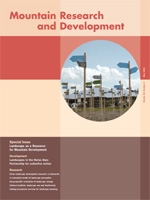COST—European Cooperation in the field of Scientific and Technical Research—supports strategic workshops in order to give participants an opportunity to elaborate future research needs. A Workshop on “Global Change and Sustainable Development in Mountain Regions” was convened at the Congress Hall in Innsbruck, Austria, from 7–9 April 2008. The event attracted 342 scientists, experts, practitioners, students, and scholars from 29 European and 10 non-European countries. It featured keynotes, discussion groups, and presentations of ongoing projects. The keynotes were presented by leading experts in their respective fields and focused on currently striking research questions. The format of the discussion groups ensured that every participant had the possibility of articulating their experiences and ideas. The project presentations gave an overview of ongoing activities and were used as a networking opportunity.
The conference led to the following conclusions:
Ongoing global change (climate, demography, economy, society, politics, and culture) concerns the whole world and is having both positive and negative effects.
Mountain regions are particularly sensitive to global change. Comprehensive monitoring systems can help to elaborate strategies that lead to regional sustainable development in mountains.
Long-term ecological research projects should include strong socioeconomic components and be based on harmonized international strategies. Future research activities should rest on the following pillars: research + monitoring + education.
Research needs
Research needs were formulated for the following key topics of global change and sustainable development in mountain regions:
Climate change
Monitoring of climate change, development of locally valid climate scenarios using appropriate downscaling instruments. Adaptation strategies need to include aspects of natural hazards.
Demographic change
Demographic change—ageing, migration, household changes, etc—is obvious and may be regarded as a second key driver of change in mountain regions. Depopulation and marginalization of remote areas cause many problems related to ecology, economy, and social coherence.
Land use and land use change
The desired level of sustainable land use requires updated concepts of land management. Research on land management and ecosystem services is a central need. At present, the profits generated from agricultural and forestry products do not ensure sustainable land management. Marketing schemes for ecosystem services are increasingly required. Decisions on land management need to be based on a credible process of participation.
Tourism
Tourism in mountain areas is affected by climate and demographic change and other effects of globalization (new destinations, growing mobility, and new target groups). These global changes have positive and negative effects. There is a great need for research on new concepts and adaptive strategies. Tourism in mountain regions is closely connected to ecology and to traditional forms of land use. Therefore, climate and land use change are decisive factors for the development of this sector.
Water
Water is a central ecosystem service. As with climate change and the effects of socioeconomic globalization, demand will rise but production will slow down, and adaptive strategies need to be found. Juridical, ownership, and governance questions must also be taken into account.
Transport
The growth of transport generates problems for the European Alps, whereas other mountain regions presently lack accessibility. Transport and transit questions must be examined in a regional context and with a view to future traffic corridors in Europe.
International comparison
The European Alps are an intensely studied mountain region. Experiences and results cannot be simply extended to other mountain ranges. Instead, the Alps can serve as a reference for comparative studies across continents.
Science–policy interface
Research can no longer be done in an ivory tower. A strong theory–practice combination is also needed as a well-functioning interface with policy.
The need for interdisciplinarity
As participants in Innsbruck had different disciplinary backgrounds and came from almost all mountain regions of the world, the discussions demonstrated very clearly that future research must be designed in an interdisciplinary manner, as mountains are very complex systems. Furthermore, it became very clear that the statuses of development and the problems of different mountain regions are far from similar: therefore, strategies for confronting global change must be defined within the local or regional context.
The outcome of the conference will support numerous existing international networks dealing with ecological and economic challenges in mountain regions. Among other things, the results will be acknowledged and used by The Mountain Partnership (FAO), The Alpine Convention, the Carpathian Convention (UNEP), the International Scientific Committee on Research in the Alps (ISCAR), the Mountain Research Initiative (MRI), and many others.
The presentations can be found on the meeting webpage at http://bfw.ac.at/mountain/. The page also links to the website of the Mountain Research Initiative, where webcasts of the keynote presentations are available free of charge.





